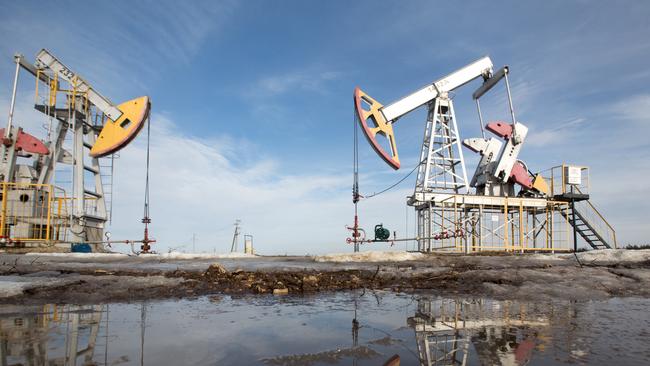Oil price pain threat as Israel war flares, but markets ignore worries
They’re called oil shocks for a reason, and a wider war in the Middle East could send prices climbing higher than almost everybody imagines.

QLD Business
Don't miss out on the headlines from QLD Business. Followed categories will be added to My News.
History has not been kind to investors, consumers and economies when it comes to oil prices and big blow-ups in the Middle East.
As the Israel-Hamas war intensifies, there have been early fears that if major oil producing nations such as Saudi Arabia and Iran become involved or impacted it could quickly cause a global recession.
It would be sparked by surging crude oil prices that could double, treble or worse if Middle East production plunged.
Financial markets are not, however forecasting such a scenario, and crude oil prices have actually dropped in the past month, from around $US93 a barrel to $US83.
AMP chief economist Shane Oliver said continuing uncertainty in the Middle East could see crude oil top $US100 a barrel in the coming months, but a broader war could fuel massive price spikes that would almost certainly lead to global recession.

“If there is lots of noise and uncertainty, it could get to $US100, but I think there would be a cap on it because the world economy is slowing down,” he said.
Crude oil above $US100 would accentuate an economic downturn and weaken demand for fuel, Dr Oliver said, but he warned that a “major conflagration” involving Iran and impacting Saudi Arabia’s production could have much wider effects.
Five Middle East countries rank among the world’s top 10 oil-producing nations, and oil shocks in the 1970s showed the potential for massive price rises.
“Historically when there has been major disruptions to oil coming out of the Middle East we have see oil prices go up in multiples – threefold and fourfold,” Dr Oliver said.
“In 1970 it went up fourfold, from $3 to $12, when OPEC put sanctions on exports. In the Iranian Revolution in 1978 and 1979 it jumped threefold.”
Dr Oliver said each $US1 rise in crude oil added about 1c a litre to petrol prices, so a rise to $US100 would see pump prices climb about 15c.
“If Iran or a major oil producer is brought into the conflict … you could see a massive rise before a recession sets in and brings down prices,” he said.
Saudi Arabia is currently the world’s second-largest oil producer behind the US, followed by Russia, Canada and Iraq, while the United Arab Emirates, Iran and Kuwait also sit in the global top 10, according to the US Energy Information Administration.
Australia is the world’s 31st largest producer, sandwiched between Libya and Vietnam. It is also the world’s 16th largest natural gas producer, and in terms of liquefied natural gas exports Australia ranks second globally behind Qatar.
KPMG chief economist Brendan Rynne said Australia was dependent on world oil supply.
Dr Rynne said futures markets had projected petroleum prices effectively remaining steady over the next month “and then start to come back down” in line with typical northern hemisphere winter trends.

“The market doesn’t believe that the current conflict between Israel and Gaza is going to spread and cause disruption to oil production globally,” he said.
“But markets can get it wrong.”
High levels of geopolitical tension had turned the Middle East into a tinderbox, which was why the US had been urging Israel to hold off on its ground offensive, Dr Rynne said.
Global financial advisory firm deVere Group’s CEO, Nigel Green, said a tightening of US sanctions on Iran’s oil exports could impact investment portfolios everywhere.
“Developing economies are particularly vulnerable to oil price spikes,” he said.
“Many of these countries rely heavily on imported oil, and surging prices can strain their trade balances and currencies. Investors with heavy exposure to these markets need to be extra cautious.
“In addition, changes in oil prices influence currency exchange rates.”
More Coverage
Originally published as Oil price pain threat as Israel war flares, but markets ignore worries





